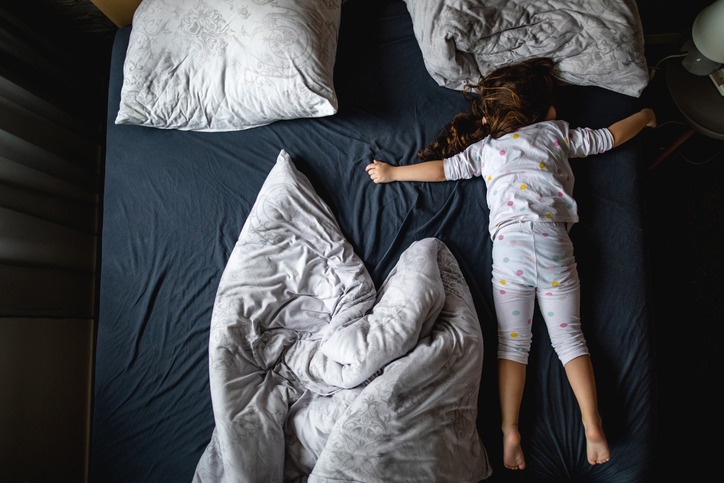How to Tell If Your Child Has a Sleep Problem

Clinical psychologists and authors Rachel Hiller and Michael Gradisar have helped hundreds of children (and their parents) to sleep better through the night. In this edited excerpt from Helping Your Child With Sleep Problems, they give advice on how to tell if your child has a sleep problem.
It is completely normal to sometimes have trouble sleeping (for children and adults). No one’s sleep is perfect all of the time. However, if problems occur multiple nights per week, and last for months, this can indicate that your child has a sleep problem.
All children will likely go through periods where their sleep is not as good as usual. They may be anxious about something at school. There may be difficulties or extra stress in the home (like parental separation). They may even have seen something scary on television. However, in some cases these problems can persist for months. This can have a serious impact on family life, especially around night-time. Often parents must lie in bed with their child for hours until they fall asleep. Many will spend years with their child asleep in their bed or in their bedroom. Child sleep problems can be particularly exhausting and time consuming for parents to manage.
Problematic Night-Time Behaviours (When Persistent)
- Resisting or stalling to avoid going to bed
- Anxious at night and/or anxious about going to bed
- Needing a parent or sibling in their bedroom in order to sleep
- Wanting a parent awake and near their bedroom (e.g. in the next room) in order for them to fall asleep
- Sleeping in the parents’/parent’s bed or bedroom (e.g. a mattress on the floor)
- Taking a long time to fall asleep (as a guide – longer than 20 minutes)
- Getting up and down from bed after you’ve put them to bed
- Waking a lot during the night (needing parents to help them fall back to sleep)
- Waking up during the night to go to sleep in the parents’/parent’s bed or bedroom
- Anxious about sleeping away from home (e.g. sleeping over at a grandparent’s or friend’s house; going on a school camp)
There are also some unusual behaviours that can occur after the child has fallen asleep. During the night, some children may sleep-walk, some may wet the bed, and others can begin screaming, yet do not respond to a parent’s comfort (night terrors). This collection of behaviours are known as ‘parasomnias’.
Insomnia
When a child has significant difficulty falling asleep and/or staying asleep, and suffers daytime consequences because of their poor sleep, it is referred to as insomnia. For children, it can sometimes be referred to as ‘behavioural insomnia’ or ‘insomnia of childhood’. For insomnia to be formally diagnosed, the problem needs to persist over several nights per week (at least three nights per week) and have been ongoing for a number of months (at least three months). In children, we typically see insomnia stemming from anxiety.
The child might refuse to go to sleep unless a parent is lying with them or they are in their parents’ bed, or they might wake up and not return to sleep unless a parent goes to them or they can sleep in their parents’ bed. Parents often describe night-time as being particularly stressful – with their child getting very distressed and anxious at even the mention of going to sleep without the parent with them.
Parasomnias
Parasomnias are a group of sleep problems that are categorised as unusual or unwanted experiences, which occur when people are sleeping. In children, perhaps the most common parasomnias are bed-wetting, night terrors and sleep-walking. These unusual behaviours occur due to a clash between deep sleep and a burst of activity in the body.
As such, the child will be in a state of awareness that lies between sleeping and waking. Some of these behaviours can be quite distressing to watch, but fortunately the child is not aware of them and does not recall them the following morning.
Helping Your Child with Sleep Problems
Edited by Peter Cooper
by Michael Gradisar
by Rachel Hiller
Edited by Polly Waite
Does your child have trouble getting to sleep? Are they worried about being left alone?
Sleep problems are a common issue for school-aged children and can be a stressful situation for child and parent alike. But whether your child suffers from bedtime separation anxiety, insomnia or night-terrors, or simply refuses to sleep in their own bed, this book can help.
Written by expert authors with experience of treating childhood sleep disorders, this easy to read manual uses tried and trusted techniques from cognitive behavioural therapy (CBT) to help everyone have a better night's sleep, including:
· Using sleep diaries to set a sleep routine that helps your child fall asleep quicker
· Proven methods for helping your child to face their worries around bedtime
· Strategies for dealing with bedwetting, night terrors and sleepwalking
This step-by-step guide to establishing better sleep patterns will help you become a sleep therapist for your child!
Helping Your Child is a series for parents and caregivers to support children through developmental difficulties, both psychological and physical. Each guide uses clinically-proven techniques.
Series editors: Professor Peter Cooper and Dr Polly Waite








